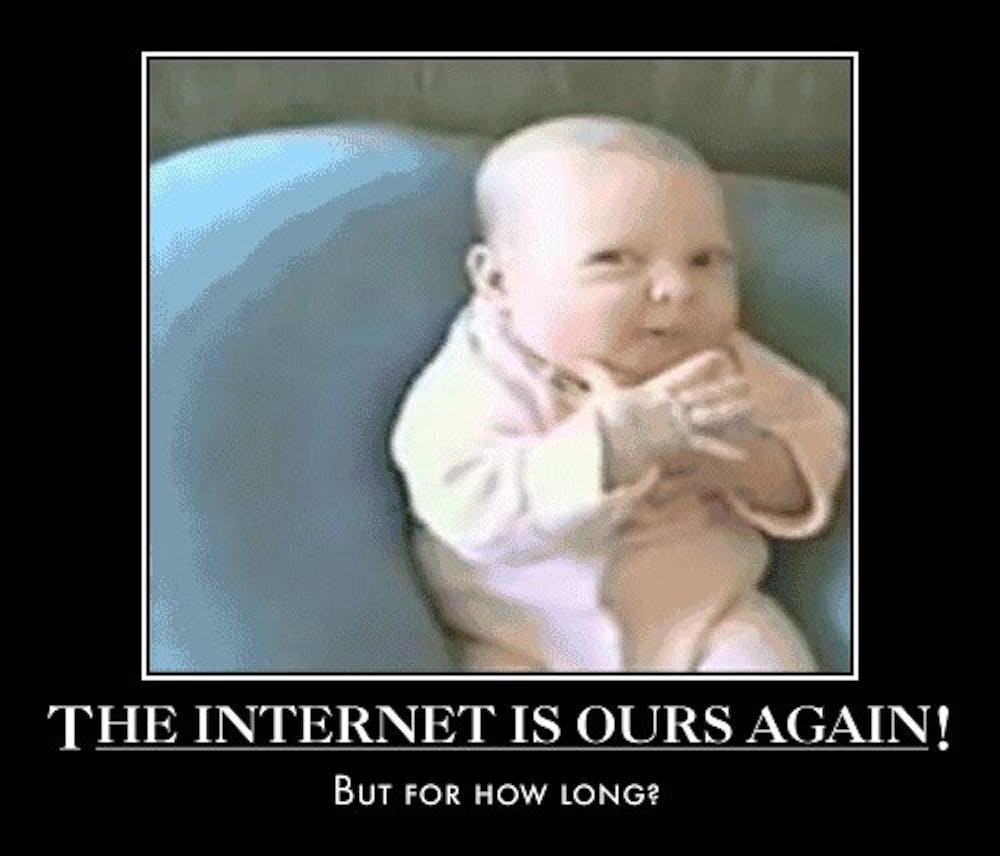We beat 'em! Time Warner Cable has eliminated its tiered pricing structure for Internet in its three accounced markets, one of which was Greensboro, a pricing structure that The Pendulum, along with several other media outlets, spoke out against rather strongly. It's nice to see a corporation bowing beneath the will of its customers, though much of the vehement hatred of Time Warner Cable is a bit unfounded, the new prices were just tests after all, as ill-advised as they may have been. Beneath the cut is the piece that ran in The Pendulum this week, in case you haven't already given it a look.
Surfing the web in the kiddy pool Bandwidth restrictions reach Greensboro
For many, the Internet is a buffet, a limitless feast for which they pay an initial fee, then browse and enjoy to their heart's content.
Time Warner Cable is testing a new pricing structure in Greensboro that would change this long-held model and alter Internet consumption for many customers.
Internet traffic, according to Time Warner's internal figures, has increased by 50 percent for several years. To compensate for this continuous demand and for the strain upon their infrastructure, they are moving to create a tiered billing plan that would place limits upon the bandwidth individual residential customers can use.
The limits range between five and 40 gigabytes, with prices falling between $29.99 and $54.90 per month, though a 100-gigabyte plan is in the works after customer feedback indicated a desire for more breathing room.
For the tech-savvy, this sounds like an air raid siren, a shrill warning that their way of life is about to come to an end. As more and more content becomes available through the Internet, as the digital distribution of entertainment transforms from an oddity to the standard, such a fundamental transformation of an Internet provider's relationship with its customers seems counterintuitive. To Time Warner, this transformation is necessary.
Melissa Buschar, director of media relations for the company's Carolina region, argues that it's a question of creating equity. The Internet has changed, and service providers need to change their pricing to maintain the speed and services customers expect.
Buschar is not alone, as companies nationwide have tampered with tiered pricing for quite some time. Comcast instituted a 250-gigabyte limit late last year for residential users. Although this provides users with a much higher ceiling, the punishments for exceeding the ceiling are draconian. Customers who go over the 250 gigabytes twice over six months will find their accounts canceled for a year. Under Time Warner's plan, customers are charged $1 for every extra gigabyte they use.
It's important to remember this program is currently just the second round of Time Warner's testing. Beaumont, Texas hosted the first trials last year, and only 14 percent of users exceeded their limits. The Greensboro test, which accompanies similar tests in Austin, Texas, San Antonio, Texas and Rochester, N.Y., begins with three months of preparation, during which customers can monitor their bandwidth consumption before the pricing is put into motion.
Though Time Warner's concerns are valid, as unrestricted consumption of bandwidth can quickly lead to broadband access becoming an unprofitable venture, their methods are laced with more cynical and self-serving concerns.
The decreasing dependence on television for both serialized shows and on-demand films is putting a crunch on cable providers. By requiring every single episode of "Lost" viewed online or each movie downloaded to be a careful decision based on one's fiscal and Internet restrictions, it's hard to believe Time Warner doesn't consider this price model a volley against digital distribution.
If 86 percent of customers didn't exceed their limits during the Beaumont tests, the question then is why they must be punished for their frugal habits through bandwidth limitations. It's Internet hogs, Time Warner argues, who are the reason for such a drastic change. But if that's the case, then why not charge these users more while letting everyone else enjoy unrestricted waters in which to surf? A compromise will have to be made between customers, service providers and suppliers of digital content. Putting Internet users within strict confines sends out a warning to Web masters and associated companies, one that can result in greatly reduced innovation, a decline in quality and a retreat from the current trend for easily obtained digital alternatives to physical media.
In kindergarten, there was always one kid who hogged the crayons and used them up until they were crumbly nubs, while the rest of the class stayed within reasonable artistic consumption. The solution, when the little Picasso has used far too many crayons, is not to sit the class down and put a restriction on everyone's drawing freedom, whether it be by limiting paper, crayons or the scenes they can depict. Just take the excessive users aside and either attach reasonable punitive measures to their extremes or give them an individual limit within agreed parameters.
In short, don't sink the ship to spite the Captain.


